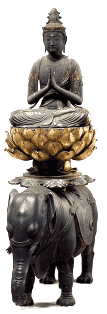The word bodhisattva
The word bodhisattva is a compound made up of the Sanskrit words bodhi meaning ‘enlightenment’ and śakta meaning ‘attached to.’ Thus a bodhisattva is a being who has dedicated himself or herself to attaining enlightenment. In the Tipiṭaka, the word bodhisattva is used exclusively for the Buddha before his enlightenment. The Jātaka stories are, according to tradition, accounts of the Buddha’s life and deeds as a bodhisattva.
Mahāyāna Buddhism recognizes many bodhisattvas, the most important being Maitreya and Avalokiteśvara. According to Mahāyāna, these and other bodhisattvas have taken a vow to attain enlightenment only after all other beings have done so. To this end, they have been reborn in a heavenly realm where they respond to people’s prayers for help.
The Bodhisattva Idea in Buddhist Sanskrit Literature, H. Dayal, 1932.
